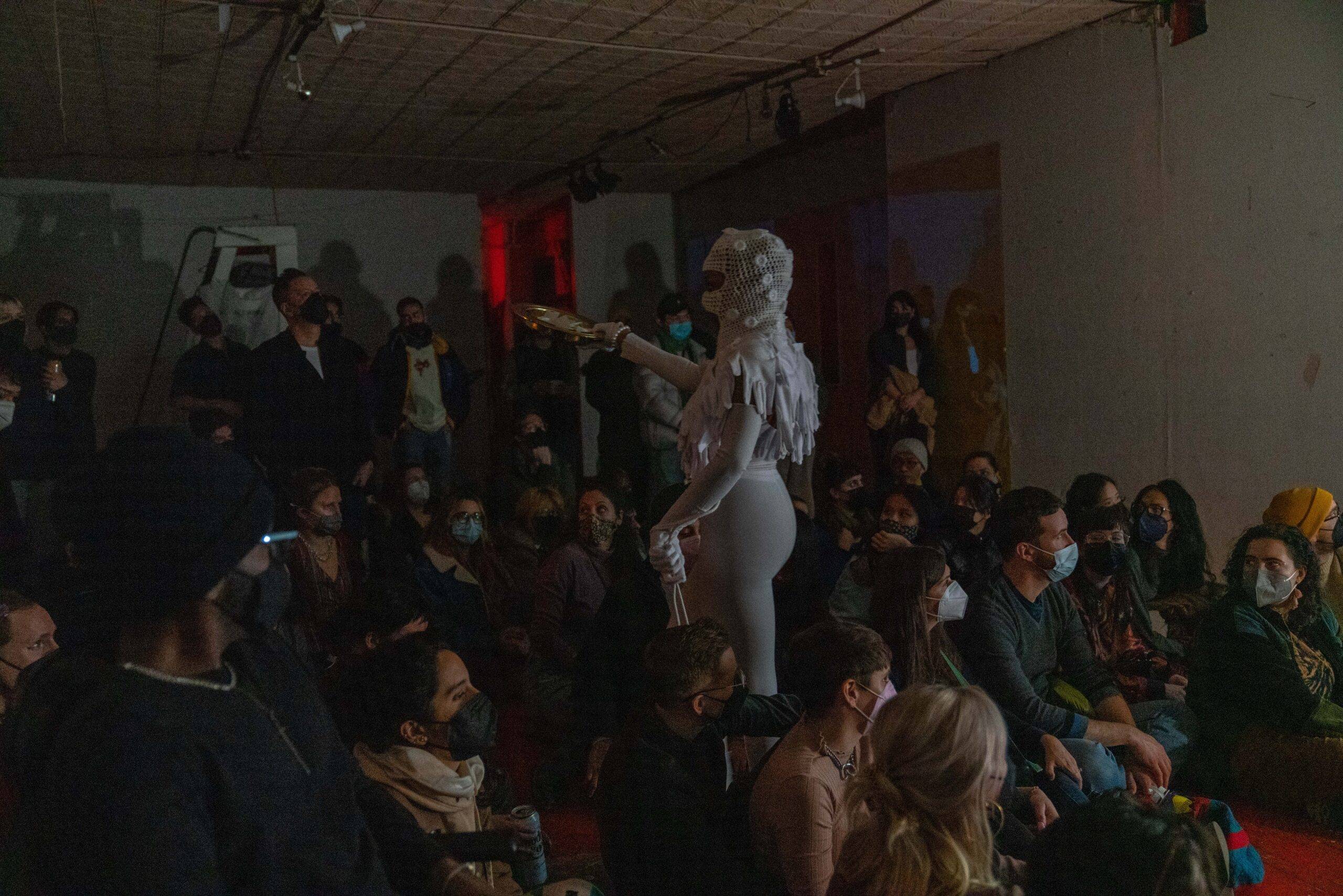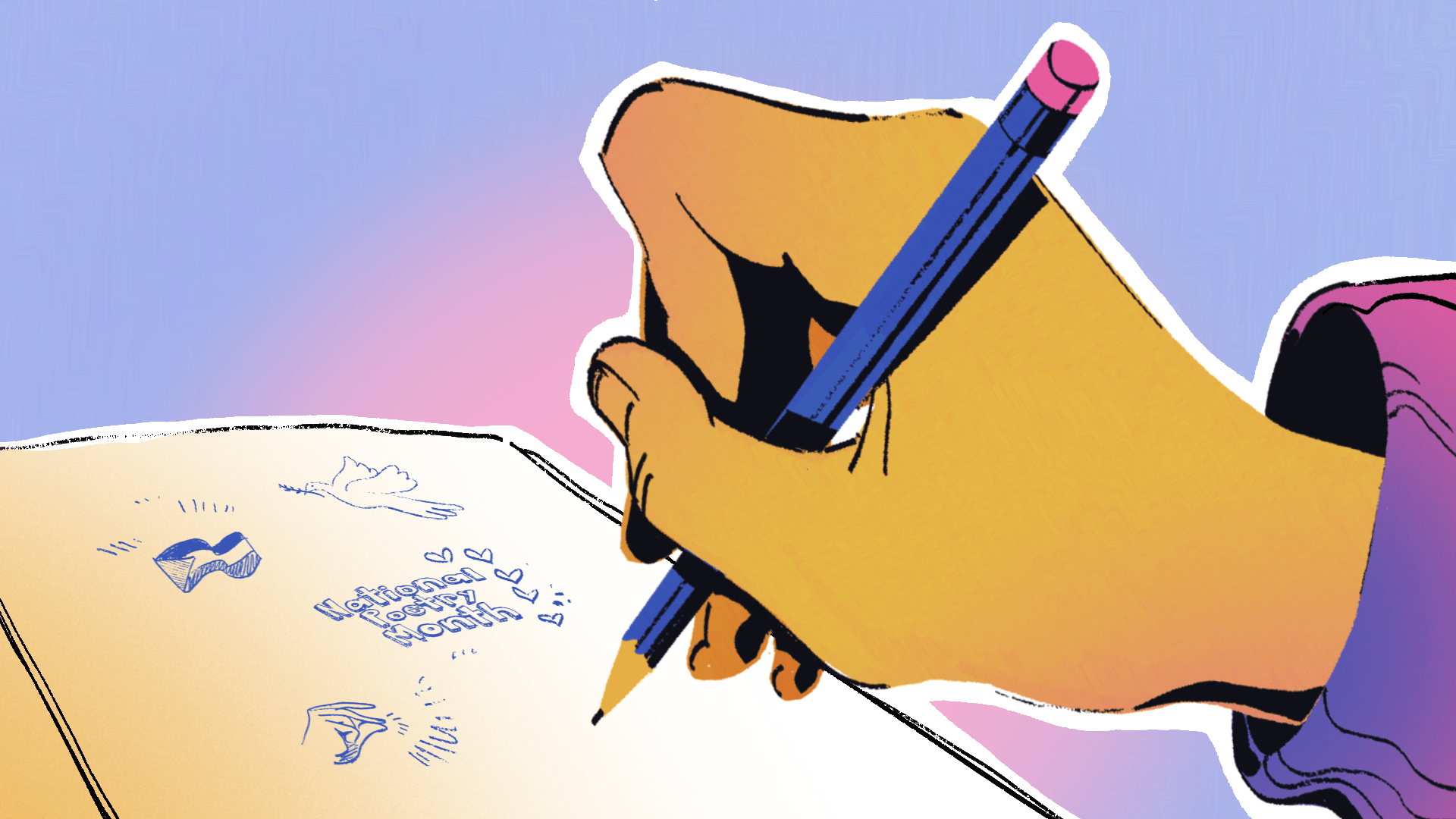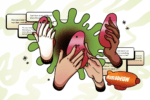
Isra Rene Performs at {\}() {\)∆‡!(){\} during the ALL ABOUT LOVE performance art night happening with Suspended Culture Collective. Photo Courtesy: Eugene Tang
Chicago houses a diversity of artists of all kinds, and it fosters limitless potential to nurture DIY culture. DIY venues have been among the main supports to alternative exhibition and performance, allowing for greater inclusivity across the artistic community.
No Nation (aka {\}() {\}∆‡!(){\} Tangential Unspace Art Lab) and Tritriangle contribute significantly to community building and cultural leadership in the arts world. They have been supporting experimental performance arts and music since 2010 and 2012, respectively. (Tritriangle’s precursor was Enemy, an experimental music venue on the same site, directed by Jason Soliday, an electronic musician, between 2005 and 2012.)
As a fellow experimental artist, grassroots collective director (//sense—an SAIC-based experimental time-based arts collective), and independent curator, I admire their efforts as they resonate with my two major curatorial principles: “making good communities better” and “finding arts in all things.”
No Nation’s and Tritriangle’s successes are not without obstacles. Like many other DIY venues, they face potential displacement. After the Chicago Recovery Plan awarded a grant of $5 million to Equity Arts, the Lubinsky Building (where the venues are located) is on the brink of being sold.
School of the Art Institute of Chicago students, faculty, and alumni who work in experimental time-based arts frequently attend and perform in these two venues. Their directors, William Amaya Torres and Ryan T. Dunn, are SAIC alumni themselves (MFA in Film, Video, New Media, and Animation and MFA in Sound, respectively). The experimental arts idioms featured in the spaces include noise, sensory overloads, confrontational actions, provoking performance, and beyond. These techniques are unlikely candidates, if welcomed at all, in institutionalized white cubes.
DIY venues are the only outlet for us to showcase these works. Since my arrival in Chicago, I’ve showcased more than 90 artists within a year through large-scale experimental theater and screenings for experimental films and videos. I understand the importance of securing venues for my artists and community.
With the probable displacement of No Nation and Tritriangle, experimental artists like us have a lot at stake as we might lose two major venues for experimental arts. To understand the significance of these independent spaces and what their displacement would mean for artists, F Newsmagazine spoke to several SAIC graduate students who are involved in these spaces.
Marco Guagnelli Gonzalez, a Mexican second-year MFA in Performance, serves as a community theater director in Mexico City. His works reflect his deep concern for the environment, social, gender, and beyond. Examining justice and awareness on these issues, Guagnelli has performed several times at No Nation.
“Before I participated as an artist in No Nation, I was a spectator,” Guagnelli said. “As a spectator, I always felt welcome because it is a public and free performance space, whose mission is centered on giving a voice to underrepresented communities [BIPOC, people with disabilities, and individuals within the LGBTQIA+ spectrum].”
Guagnelli recalled his own experience as an artist in Mexico City, where resources for experimental artists were more scarce, and dynamic, independent spaces like No Nation simply didn’t exist.
“We always have to go through institutions, which bureaucratizes art and takes away some freedom to experiment,” he said.
To counteract the institutionalized environment, Guagnelli sees street performance as a potential.
“The street is where many experimental and community artists have found their space of freedom. However, this has put many of us in danger, as we have been attacked and arrested by the police,” Guagnelli said.
Besides providing a safe space for experimental performance works to thrive, Guagnelli also points out the diversity of No Nation’s programs: “No Nation’s curation is very diverse, featuring a mix of emerging and established artists. The profile of these artists is often critical of the system, making this space a place where one can challenge power structures, a space for free expression, critical thinking, and open dialogue.”
Michael Orr—a third-year MFA in FVNMA—resonates with the inclusivity of No Nation. Orr, who is also an animator, painter, and performance artist said, “They seek raw expression and motivate just that in their performers by developing a space that provides ample space, flexibility, and availability in resources to make almost anything possible. Just about everything is welcome at all levels and individual expertise. Writing, poetry, singing, music, drawing, painting, film, performance, any mixture of the few and on and on, regardless of identity or the individual voice. I personally feel no pressure being as close as true to my vision.”
Seeing the potential displacement of No Nation, Guagnelli empathized, “The most unfortunate aspect of not having No Nation would be that our work, which often goes against the system, loses its outlet, which would in turn jeopardize the integrity of the community.”
No Nation’s neighboring venue, Tritriangle, which resides in the same building, creates space for experimental music. It hosted ACCIDENT FEST, a marathon experimental music fest, in 2018, 2019, and 2023. Tritriangle invites Illinois based musicians as well as performers from other states, including Florida, Georgia, New York, North Dakota, Pennsylvania, Tennessee, Texas, Washington, Wisconsin. Each place has its own experimental sound, enriching the Chicago scene.
Yiyi Liu is a third-year MFA who will be representing the Department of Art and Technology Studies in the upcoming Ars Electronica Electronics Arts Festival in Austria. Like many other Chicago-based artists, he premiered his first shows in Chicago at Tritriangle and No Nation this April. Liu participated in the not.gli.tc/h festival — a Chicago-based glitch arts festival curated primarily by Nick Briz (FVNMA faculty), Jon Satrom (SAIC alum), and Rosa Menkman (media artist from the Netherlands)—hosted at Tritriangle on April 1, 2023.
“I was pleasantly surprised to enjoy so many performances related to glitch art that night. As a newcomer, I felt the inclusivity and fairness of the space. I performed with new media artists Juan Flores and Gordon Fung [the author], and it was an invaluable experience for me,” Liu said.
“About a few weeks later, I did another experimental performance show at No Nation as a member of the //sense troupe, where our module engaged in performance, experimental video, and experimental music,” he said.
“Without these two remarkable venues, the journey of showcasing my work to the public could have been more challenging. These crucial spaces provide me with creative platforms where I can comfortably refine my craft. Amaya from No Nation plays a role by nurturing emerging talents and consistently offering a platform for new artists. I understand the difficulties of maintaining and managing DIY venues, which makes me appreciative of these opportunities,” Liu said.
No Nation was also the venue for an SAIC’s Installation class, taught by Tirtza Even — an experimental video documentary maker, installation artist, and FVNMA faculty — in December 2022. Irina Botea Bucan, a filmmaker and performance artist, was a recent artist-in-residence at No Nation in summer 2023. Bucan, from Romania, teaches a summer low-residency class at SAIC and was a Chandler Family Awardee in 3Arts.
Recognizing No Nation’s community building and leadership, Comfort Station at the Logan Square invites No Nation to contribute to a program under the Force & Motion Series on August 18, 2023, alongside two other Chicago-based experimental arts collective in the same month: Suspended Culture—an emerging Black art collective and //sense. No Nation has also collaborated with organizations outside of the US: Muestra Dislocada, AVD Performance Art festival, Latidoamericadeperformance, PEPA Performance Patagonia, ROSCA (an International cultural production platform between Venezuela and Spain), and beyond.
No Nation and Tritriangle’s support of the Chicago arts community is notably tremendous. If No Nation and Tritriangle were to be displaced, not only experimental artists lose their outlet, but the communities that are built around these two spaces for over 10 years will also be disrupted, if not uprooted.
While experimental performance and sound artists are still navigating between this uncertainty of whether No Nation and Tritriangle will remain in Wicker Park, this struggle invites several questions that we must reflect on: How can we maintain the Chicagoan art scene that we, and the next generation of artists, will be proud of? How can we support DIY scenes and make them more sustainable? How do venues and collectives collaborate with each other to build a better community?
Disclosure: Gordon Fung is an experimental artist who has benefited from the use of these spaces and is invested in their survival.





















